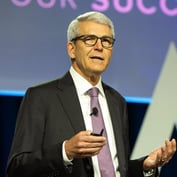The coronavirus pandemic has brought broad, deep changes to the American economy. Within financial services, it led to a stepped-up, expanded move to embrace digital technology.
“We’ve really had to tap into innovation and strategy in an advanced, expedited fashion. Technology has always been a priority for our firm, but this is on a different level,” says Amy Webber, president and CEO of Cambridge Investment Research, an independent broker-dealer, and Cambridge Investment Research Advisors, a large corporate RIA, in a recent interview.
Webber, a member of Finra’s board of governors, served as a judge for some categories and industry segments of ThinkAdvisor’s new recognition program, the LUMINARIES. She also was a 2021 LUMINARIES winner (in segments that she did not judge).
Reflecting on other major industry changes, she notes that when she began her career more than three decades ago, “most people joined a broker-dealer because they wanted somebody to answer their phone and process their commissions accurately.”
Today, BDs are partnering with advisors. At Cambridge, “in some ways, we very much take a think-tank approach in consulting with our clients,” says Webber, who joined Fairfield, Iowa-based Cambridge as president in 1998 and was appointed CEO in 2017.
Leading the firm amid the pandemic, her role as a “caregiver” to both employees and clients intensified. “I used to joke in the early stages of my career that I should have gone to school and gotten a psychology degree instead of a finance degree. But it no longer feels remotely like a joke,” Webber explains.
“It’s very difficult to balance the care your employees need and the care your clients need. If you fail your clients, you will inevitably fail your employees too,” the executive points out.
“Striking that balance has been a really interesting challenge but very rewarding,” she says.
A leading, long-time advocate of diversity in the workplace, Webber notes that she’s recently become “particularly intrigued with solving for inclusion.” Industry CEOs and board directors should be more involved in addressing diversity, equality and inclusion, or DEI, she says.
“It would be great if [they] would take interest in their organizations to make sure there are DEI strategies and that everybody in the company realizes [they’re] supported from the very top — and works together to identify obstacles to attracting, recruiting and creating a supportive environment for everyone and anyone,” she explains.
“If we create and address inclusion broadly, it will also help firms in the diversity and equality categories,” adds Webber.
Praising industry recognition awards such as the LUMINARIES, she explains: “Recognition is a basic healing motivator across the board. Our industry has had its share of negative press: Bad actors, bad decisions get publicized.
“That’s what makes it important for us to celebrate the successes and the heart of this industry. It needs to be honored and recognized,” Webber adds.
In the podcast interview, the Cambridge president and CEO discusses a number of pressing advisor issues.
NOT FOR REPRINT
© 2024 ALM Global, LLC, All Rights Reserved. Request academic re-use from www.copyright.com. All other uses, submit a request to [email protected]. For more information visit Asset & Logo Licensing.









 December 17, 2021 at 09:41 AM
December 17, 2021 at 09:41 AM









